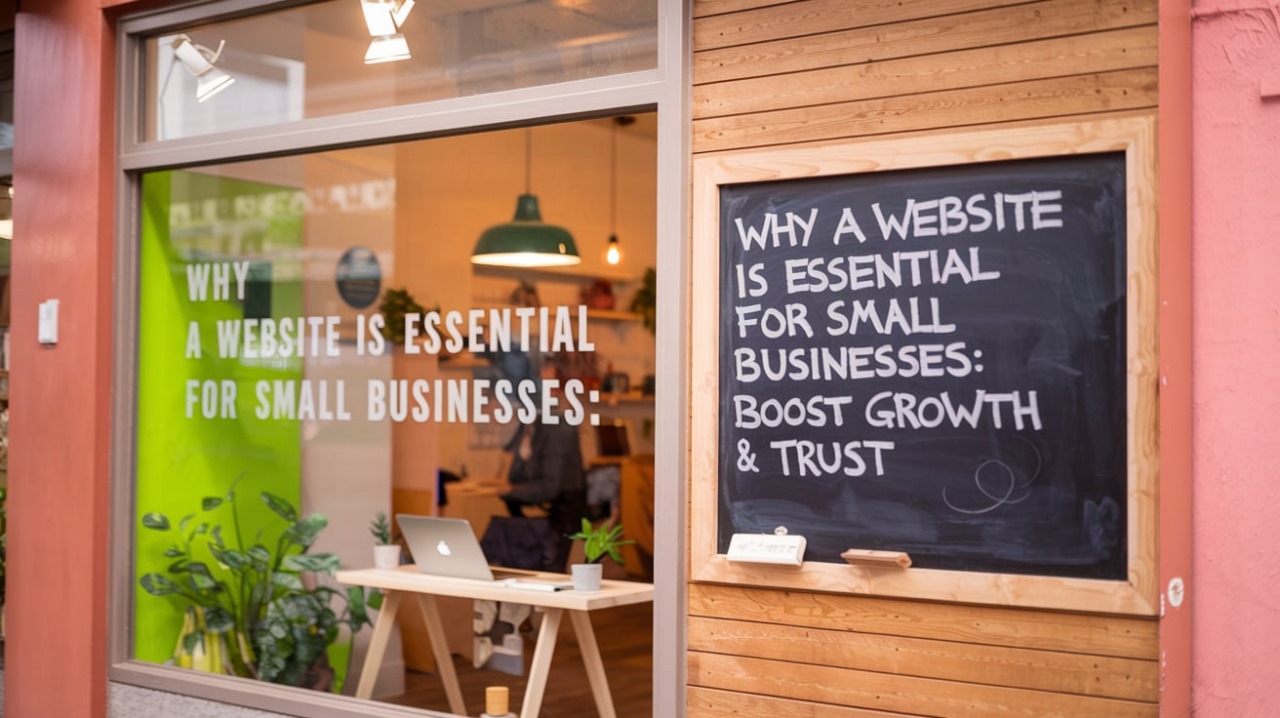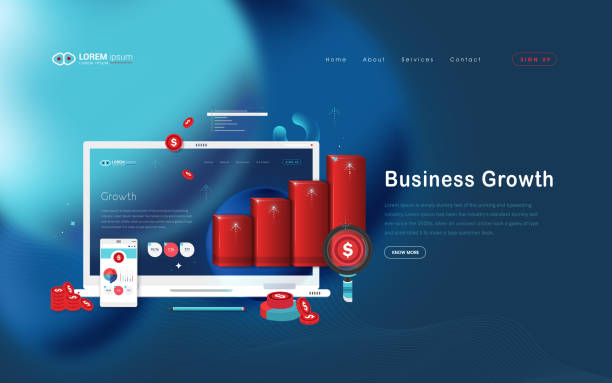Why a website is crucial for small businesses. Improve credibility, attract new customers, and boost growth with an effective online presence.
The Importance of a Website for Small Businesses
In today’s digital world, a website is a must-have for small businesses. With more consumers turning to the internet to find products and services, having an online presence is essential. A website offers numerous benefits, from establishing trust to attracting potential customers. In this article, we’ll explore why a website is crucial for small businesses and how it can help boost your growth and success.
Why a Website is Essential for a Small Business
Establishing an Online Presence
The internet is the first place people go when they need information. Whether someone is searching for your product, service, or industry, having a website ensures that they find your business. Without a website, you risk losing potential customers to competitors who are visible online. Your website acts as your online storefront. It’s open 24/7, allowing people to learn about your business at any time. Whether your store is physically closed or you’re in a different time zone, your website will be working for you, promoting your products and services around the clock.

Credibility and Trust
A professional-looking website can significantly improve the credibility of your small business. Many customers expect businesses to have a website, and if you don’t, they may question whether your business is legitimate. Having a website with clear information, testimonials, and product details builds trust with potential customers. It shows that you are serious about your business and are willing to invest in its success. Moreover, a well-designed website can enhance your reputation and make your business appear more established.
“15–50% is the revenue growth small businesses typically see when they use their websites to engage with customers. 97% of customers say websites influence their purchases. 91% of customers visited a store after interacting with an online website.”
How Websites Impact Small Business Success?
A website can have a significant impact on small business success. Here are some key statistics to consider:

- Conversion rates: Businesses with websites can experience a higher conversion rate, as customers can easily make purchases or contact the company online.
- Lead generation: A website acts as a lead-generation tool. By capturing customer information through forms or newsletters, you can nurture leads and turn them into loyal customers.
- Local SEO: A website with local SEO strategies can help small businesses stand out in local search results. This is crucial for businesses that depend on local customers.
- Cost-effective marketing: Websites provide a cost-effective way to market your products or services. Unlike traditional methods like print ads or TV commercials, a website allows you to reach a broad audience at a lower cost.
Attracting New Customers
A website is an excellent tool for reaching new customers. Through search engine optimization (SEO) techniques, your website can rank higher on search engines like Google, making it easier for people to find you. An optimized website can help your business get in front of the right audience, leading to increased traffic and potential sales. Additionally, your website allows you to showcase your products or services in a way that is more engaging than traditional advertising. Whether it’s through blogs, videos, or customer reviews, you can provide content that resonates with potential customers, encouraging them to choose your business.
Overview of What This Guide Will Cover
In this article, we will dive deeper into the following points:
- The role of a website in growing your small business.
- How having a website builds credibility and trust.
- How websites help attract new customers.
- Key statistics that highlight the importance of a website for small businesses
The Role of a Website in Growing Your Small Business
Your website acts as your business’s online storefront, open around the clock. Unlike physical stores that have set hours, a website allows potential customers to explore your offerings at any time. This is especially helpful for businesses that operate in different time zones or have a global customer base.
Cost-Effective Marketing
Having a website reduces your need for costly traditional advertising methods like print ads, billboards, or direct mail campaigns. Instead, you can use your website to share promotions, new products, and services, all at a fraction of the cost. Additionally, through SEO and social media marketing, you can attract organic traffic to your site.
Tracking Performance
Websites provide valuable insights into your customer behavior. With tools like Google Analytics, you can track user behavior, such as the pages they visit, how long they stay, and where they are coming from. These insights help you make informed decisions and fine-tune your marketing strategies.
24/7 Availability
Your website acts as your business’s online storefront, open around the clock. Unlike physical stores that have set hours, a website allows potential customers to explore your offerings at any time. This is especially helpful for businesses that operate in different time zones or have a global customer base.
How a Website Builds Credibility and Trust
Trust is a vital element in building long-term relationships with customers. A website helps build trust in several ways:Professional Design
A clean, well-designed website creates a positive first impression. It shows that you’ve invested in your business and are committed to providing value to your customers. When visitors see a polished, professional website, they are more likely to trust your business.
Customer Reviews and Testimonials
Websites offer space for customer reviews and testimonials, which act as social proof. When potential customers see positive feedback from previous clients, they feel more confident in making a purchase or contacting your business.
Clear Contact Information
A website provides an easy way for customers to contact you. Having a clear, accessible contact page with your phone number, email address, and physical address (if applicable) increases transparency and builds trust. It reassures customers that you are easy to reach in case they have questions or issues.
Suggested Posts
How Websites Help Attract New Customers
Websites are powerful tools for attracting new customers. Here’s how they help:
SEO and Organic Traffic
Search engine optimization (SEO) helps your website rank higher on search engines like Google. When your website ranks well for relevant keywords, it increases the chances of attracting new customers who are searching for products or services like yours.
Content Marketing
A website allows you to showcase your expertise through blogs, case studies, and articles. Providing valuable content not only helps attract visitors but also establishes your business as an authority in your industry. Content marketing is an effective strategy for bringing in new customers and keeping existing ones engaged.
Social Media Integration
Integrating your website with social media platforms helps expand your reach. When you share links to your website on Facebook, Instagram, or LinkedIn, you drive traffic to your site, increasing the potential for conversions.

Key Statistics on Websites and Small Business Success
Several studies show the importance of having a website for small businesses. Here are some statistics to consider
75% of consumers judge a company’s credibility based on its website design.
Small businesses with websites generate over 40% more revenue than those without one.
93% of online experiences begin with a search engine, making SEO a crucial component of business success.
70% of consumers trust a company more when they see a clear, accessible contact page.
FAQs
Why do small businesses need a website?
A website helps small businesses establish credibility, attract customers, and expand their reach. It’s a valuable marketing tool that operates 24/7 and supports customer engagement.
How can a website build trust for my business?
A well-designed website with clear information, customer reviews, and easy contact options increases transparency and reliability, which builds trust among potential customers.
How can SEO help my website attract more customers?
SEO helps your website rank higher in search engine results, making it easier for potential customers to find you. Optimizing your website content for relevant keywords can drive organic traffic.
Is having a website more cost-effective than traditional advertising?
Yes, websites are generally more cost-effective than traditional advertising methods. With a website, you can reach a larger audience at a lower cost, especially through SEO and social media marketing
Can a website help increase sales?
Yes, a well-designed website with effective calls-to-action (CTAs), clear product descriptions, and an easy checkout process can boost sales and conversion rates.
How often should I update my website?
You should regularly update your website with fresh content, new products or services, and up-to-date information to keep visitors engaged and improve your search rankings.
Key Takeaways
A website is an essential tool for small businesses in today’s digital landscape. It provides credibility, helps attract new customers, and can significantly contribute to business growth. By investing in a professional website and optimizing it for search engines, small businesses can compete effectively in their industry and reach a wider audience.
A website is crucial for building credibility and trust.
Websites help small businesses attract new customers and increase sales.
SEO optimization and content marketing can boost your website’s visibility.
A website is a cost-effective way to market your business and track performance.
